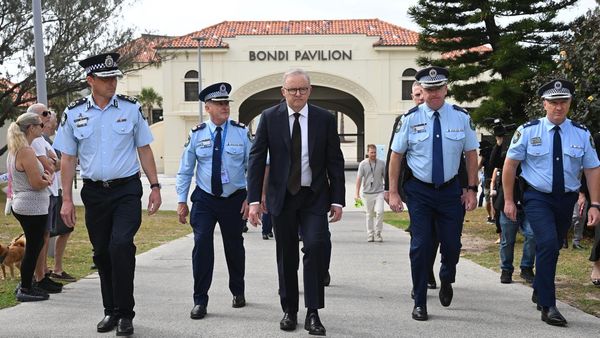Around 3,000 Tibetans around Australia are celebrating the 87th birthday of Tibet's former political leader, the Dalai Lama.
One of them, Tenzin Choeki, says her Sydney apartment is an ode to the Dalai Lama, the man who saved her life.
The 14th Dalai Lama, born on July 6, 1935, was exiled from his country after what his government, the Central Tibetan Administration, called the "Chinese invasion of Tibet".
He fled to India in 1959, but his spiritual connection to the Tibetan people remained strong, and his escape from Chinese authorities resonated with Tibetans at home and abroad.
Tenzin Choeki did the same and left Tibet 30 years later.
"[In] 1989 we did a protest. After 15 minutes, we were put in jail for three years," she told ABC NewsRadio.
"Life in Tibet is very hard, because there are no human rights at all.
Imprisonment and escape
Ms Choeki was a nun when she and several of her friends protested against not being able to access a temple.
She spent three years in prison, where she said she was only fed tea and soaked bread.
"When I was released, I was very weak," she said.
"My iron was so low I was dizzy from not enough nutrition.
At just 23 years of age, she was branded a political prisoner, and feared for her family's life if she were to stay in Tibet. So, like the Dalai Lama, she fled to India.
It took her 28 days. She travelled throughout the night, and hid during the day.
Shortly after she arrived in India, she was given the opportunity to meet the Dalai Lama, who recognised the state of her health and made sure she got medical treatment.
"For me, it was like a dream, because 99 per cent of Tibetans wish every single day, every single minute, wishing and praying to meet His Holiness the Dalai Lama," she said.
Community connects in Sydney's Northern Beaches
In 2005, Ms Choeki took advantage of a humanitarian visa program, and brought her young family from India to Australia.
Nearly 20 years later, she still lives in Sydney's Northern Beaches, with her husband and two daughters.
The largest Tibetan population lives in the area, where around 600 of them connect to community services.
"I am grateful that both my daughters are doing university. One is getting her masters and it's because of the Australian government's kindness," Ms Choeki said.
Zoe Bedford — the executive director of the Australia Tibet Council — said around half of Australia's Tibetan refugees were political prisoners.
"We have a really high number of Tibetans in Australia who experienced arrest, torture and human rights violations at the hands of China," she said.
She said that, 70 years on from China's occupation of Tibet, protests are still happening.
"This is due to desperation."
Losing culture and language
Around 100 Tibetans come to Australia each year, with roughly 3,000 living in communities around the country.
The New South Wales president of the Tibetan Community of Australia — which is based in Dee Why — is Migmar Tsering.
He lived as a monk in Tibet and, at 19 years of age, protested for his country's freedom.
That saw him jailed for four years and six months in the Chinese-controlled Tibetan capital of Lhasa where, he said, he joined 2,000 other political prisoners, mostly monks and nuns.
He accused the Chinese government of a form of "cultural genocide", with Tibetan language is being squeezed out in his home country.
"When we went into schools, there was teaching Tibetan language as a second language, but Chinese language as a first language," he said.
"That is to destroy our culture's language."
He said Tibetan language was central to understanding and practising Buddhist philosophy and was crucial for keeping Tibetan culture and religion alive.
Mr Migmar arrived in Australia in 2006.
Choedak Gyatso understands the link between language and culture better than most.
He was born to Tibetan parents in India, and later taught Tibetan culture in India to children who had fled Tibet.
Mr Gyatso and his wife found the expat community in Sydney's Northern Beaches and ,while he is grateful for the opportunity, he admits he fears his children are losing connection to their culture and language.
"They love going to school. They are making good friends," he said.
"On the other side, I am a bit worried about how we are going to keep our own language, how we can use our own language effectively at home, in our community."
A celebration of Tibetan spirit
In honour of the Dalai Lama's birthday, Mr Migmar has been arranging a community celebration at Mackellar Girls School in Manly.
Tibetan culture will be celebrated and monks will pray for the long life of the Dalai Lama.
Mr Gyatso said their spiritual leader's birthday was more important than their own.
"In Tibetan culture, we don't have a habit of celebrating our own birthday, but everybody won't miss to celebrate His Holiness's birthday," he said.
"His Holiness is a champion of peace, a champion of compassion. This is what we need at this period of time."







